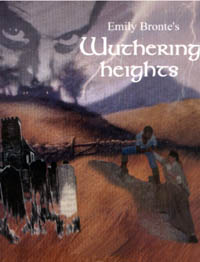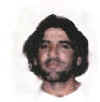




|
|
by Emily
Brontë
Adapted for the stage
&
directed by Makki Marseilles
Music composed and played by Nikos Kondos
Costumes / Hats /
Accessories by Kim O'Neill
Sets by Thanasis Emmanuilidis
First performance : 27 Nov.1999
Heathcliff, an orphan
child of unknown parents is brought up alongside Hindley and Cathy Earnshaw. He grows to hate the first and love the second to distraction.
When Cathy decides to marry Edgar Linton, the son to the local squire, Heathcliff disappears only to return three years later, stronger, richer,
and determined to take revenge. He comes between husband and wife and
causes Cathy's death at childbirth; he ruins Hindley through drink and
cards; causes the deaths of his wife, Isabella and her brother, Edgar, as
well as that of his own son, Linton. His cruelty, hatred and avarice know
no bounds but he is finally defeated by the love that grows between Cathy,
Edgar's daughter, and Hareton, Hindley's son, whom Heathcliff deliberately brutalises.
|
|
The
Author
 Emily Brontë, was perhaps the most remarkable
member of the most remarkable literary family in the English
letters. She was one of five girls, two of which died very young,
while she and two other sisters: the eldest Charlotte, (Jane
Eyre, produced by the Rainbow
Theatre in 1995) who survived them all and edited their work; and Anne, (The Tenant ofWildfeld Hall) two years younger than
Emily, were successful novelists and poets. Branwell, their only brother, who died at early age, was a talented
painter. The sisters grew up in the village of Haworth, Yorkshire, in Northern England
where their father, Patrick, an Irishman was a clergyman. Their
mother died in 1821 and the girls educated themselves. They read
widely from the books in their father's library but more
importantly, living far away from any real society they created
their own imaginary worlds which their transferred on paper. By 1847
all three girls had published their first book but Emily died a year
later without ever knowing the fate of her story. It is now widely
accepted as the greatest of all the Brontë sisters and her imaginative powers
have been compared to those of
Shakespeare. Emily Brontë, was perhaps the most remarkable
member of the most remarkable literary family in the English
letters. She was one of five girls, two of which died very young,
while she and two other sisters: the eldest Charlotte, (Jane
Eyre, produced by the Rainbow
Theatre in 1995) who survived them all and edited their work; and Anne, (The Tenant ofWildfeld Hall) two years younger than
Emily, were successful novelists and poets. Branwell, their only brother, who died at early age, was a talented
painter. The sisters grew up in the village of Haworth, Yorkshire, in Northern England
where their father, Patrick, an Irishman was a clergyman. Their
mother died in 1821 and the girls educated themselves. They read
widely from the books in their father's library but more
importantly, living far away from any real society they created
their own imaginary worlds which their transferred on paper. By 1847
all three girls had published their first book but Emily died a year
later without ever knowing the fate of her story. It is now widely
accepted as the greatest of all the Brontë sisters and her imaginative powers
have been compared to those of
Shakespeare. |
The
Novel
Wuthering Heights is Emily Bronte's only full-length work. The story
is told against the background of the wild and desolate Yorkshire
Moors, the rough open spaces constantly whipped by racing winds,
which she knew and loved so well. It was not received well when it
was first published and was criticised severely as being cruel,
brooding and miserable. The flint-like emotions which fire the
characters of the book are a far cry from the mild, polite, watered
down and gentle themes of the majority of the stories written at the
time. It was thought particularly shocking that such a story should
have been written by a woman. Only time established the book as one
of nineteenth century's most original and powerful works of
fiction. |
|
A note on the
play |
|
Respect and humility have
been the guiding lights to this adaptation which defied all efforts
to be constricted in the time limitations and the resources of the
company. The story and the characters are so powerful they almost
jumped from the page but impossible to contain within a few square
meters on the stage. Every draft reduced the length of the play but
increased the problems of production, presentation and narrative
clarity. Suggestions to truncate the story a la Hollywood, in other
words retain the romance and jettison the second generation
development, were resisted and I think rightly so. What I would
honestly like to say that whatever dramatic merit there is in the
play belongs entirely to Emily while any failure is entirely my
own.
Makki
Marseilles | |
|
The Players |
|

|
 |
 |
 |
 |
|
James
Kassaras
Heathcliff |
Isobel
Tovey
Cathy Earnshaw
|
Jason Mathew
Hare
Edgar Linton |
Arion
Pineau
Hindley
Earnshaw
Hareton
|
Maria
Tsalta
Isabella Linton
Linton
|
|
|
 |
|
 |
|
|
|
Zara
Williams
Ellen Dean |
|
Makki
Marseilles
Squire Linton
|
Scenes from the Play



|
|
|
|







 Emily
Emily 









